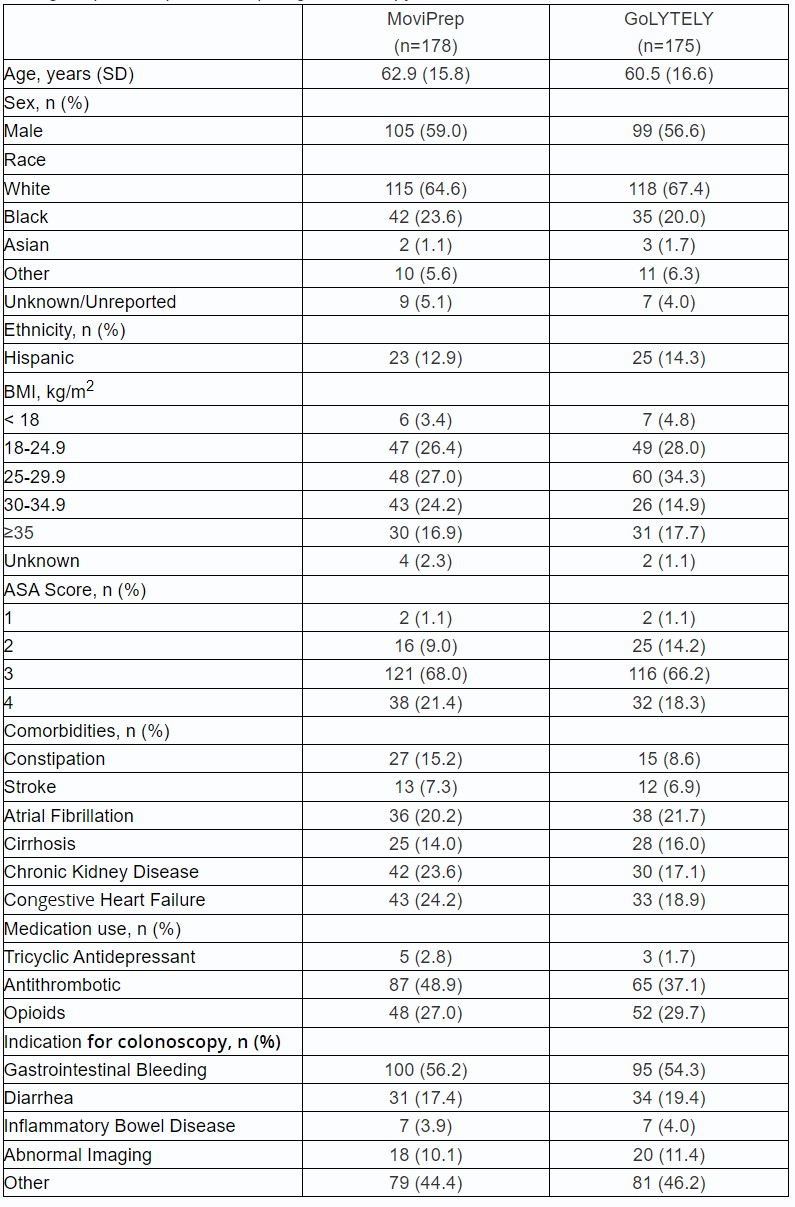Oral Paper Presentation
Annual Scientific Meeting
Session: Presidential Plenary Session 2
6 - Efficacy, Safety, and Tolerability of MoviPrep vs GoLYTELY for Bowel Preparation in Hospitalized Patients Undergoing Colonoscopy: A Randomized Controlled Trial
Monday, October 28, 2024
9:30 AM - 9:42 AM ET
Location: Terrace Ballroom
- KX
Karen Xiao, MD (she/her/hers)
Yale School of Medicine
New Haven, CT
Presenting Author(s)
Award: ACG Governors Award for Excellence in Clinical Research (Trainee)
Karen Xiao, MD1, Fatima Khan, MD1, Richard Link, MD2, Armando Dominguez-Diaz, MD2, Prince Ameyaw, MD2, Valerie Assalone, BSN2, Mimoza Nasufi, BSPH2, Michelle Hughes, MD1, Caroline Loeser, MD2, Kenneth Hung, MD, MPH1, Darrick Li, MD, PhD3
1Yale School of Medicine, New Haven, CT; 2Yale New Haven Health, Bridgeport Hospital, Bridgeport, CT; 3Yale School of Medicine / Connecticut GI, New London, CT
Introduction: Adequate bowel preparation in patients undergoing inpatient colonoscopy remains a clinical challenge. While outpatient studies have found low volume bowel preparations to be non-inferior to standard volume bowel preparations for adequate bowel cleansing, few randomized studies have looked specifically at their use in hospitalized patients. The primary aim of our study was to evaluate the effectiveness, safety, and tolerability of low volume bowel preparation for inpatient colonoscopy compared to standard volume bowel preparation.
Methods: A single-blind, randomized, non-inferiority trial was conducted at two academic medical centers within the same health system. Hospitalized adult patients scheduled for colonoscopy were randomized to receive standard volume (polyethylene glycol and electrolytes, GoLYTELY) or low volume bowel preparation (polyethylene glycol and ascorbic acid, MoviPrep). The primary outcome was adequate bowel preparation defined as a Boston Bowel Preparation Scale ≥6 with all segments scoring ≥2. Scoring was performed by a central blinded assessor. Secondary outcomes included patient tolerability, hospital length of stay, time to colonoscopy, and cecal intubation rate.
Results: 353 patients were randomized to MoviPrep (n=178) or GoLYTELY (n=175). Medical comorbidities included chronic kidney disease (n=72) and congestive heart failure (n=76). MoviPrep was non-inferior to GoLYTELY in rates of adequate bowel preparation (55.6% vs. 53.7%, p=0.01 for non-inferiority). More patients receiving MoviPrep found the bowel preparation to be “easy” or “acceptable” to tolerate compared to GoLYTELY patients (71.3% vs. 49.0%, p< 0.01). Hospital length of stay (10.1 vs. 10.3 days, p=0.86), time to colonoscopy (20.2 vs. 20.6 hours, p=0.81), and cecal intubation rate (94.9% vs 94.3%, p=0.78) were similar. No significant difference was detected with regards to hyponatremia (2.5% vs. 3.4%, p=0.54), hyperkalemia (0.6% vs. 0.0% p=1.00), or acute kidney injury (4.5% vs. 2.9%, p=0.57).
Discussion: Among inpatients requiring colonoscopy, MoviPrep was non-inferior to GoLYTELY in achieving adequate bowel preparation without increased risk of electrolyte disturbance or acute kidney injury. Patients also reported significantly higher tolerability of bowel preparation with MoviPrep. Our findings suggest that low-volume bowel preparations may be a reasonable alternative to standard volume bowel preparation among hospitalized patients requiring colonoscopy.

Disclosures:
Karen Xiao, MD1, Fatima Khan, MD1, Richard Link, MD2, Armando Dominguez-Diaz, MD2, Prince Ameyaw, MD2, Valerie Assalone, BSN2, Mimoza Nasufi, BSPH2, Michelle Hughes, MD1, Caroline Loeser, MD2, Kenneth Hung, MD, MPH1, Darrick Li, MD, PhD3, 6, Efficacy, Safety, and Tolerability of MoviPrep vs GoLYTELY for Bowel Preparation in Hospitalized Patients Undergoing Colonoscopy: A Randomized Controlled Trial, ACG 2024 Annual Scientific Meeting Abstracts. Philadelphia, PA: American College of Gastroenterology.
Karen Xiao, MD1, Fatima Khan, MD1, Richard Link, MD2, Armando Dominguez-Diaz, MD2, Prince Ameyaw, MD2, Valerie Assalone, BSN2, Mimoza Nasufi, BSPH2, Michelle Hughes, MD1, Caroline Loeser, MD2, Kenneth Hung, MD, MPH1, Darrick Li, MD, PhD3
1Yale School of Medicine, New Haven, CT; 2Yale New Haven Health, Bridgeport Hospital, Bridgeport, CT; 3Yale School of Medicine / Connecticut GI, New London, CT
Introduction: Adequate bowel preparation in patients undergoing inpatient colonoscopy remains a clinical challenge. While outpatient studies have found low volume bowel preparations to be non-inferior to standard volume bowel preparations for adequate bowel cleansing, few randomized studies have looked specifically at their use in hospitalized patients. The primary aim of our study was to evaluate the effectiveness, safety, and tolerability of low volume bowel preparation for inpatient colonoscopy compared to standard volume bowel preparation.
Methods: A single-blind, randomized, non-inferiority trial was conducted at two academic medical centers within the same health system. Hospitalized adult patients scheduled for colonoscopy were randomized to receive standard volume (polyethylene glycol and electrolytes, GoLYTELY) or low volume bowel preparation (polyethylene glycol and ascorbic acid, MoviPrep). The primary outcome was adequate bowel preparation defined as a Boston Bowel Preparation Scale ≥6 with all segments scoring ≥2. Scoring was performed by a central blinded assessor. Secondary outcomes included patient tolerability, hospital length of stay, time to colonoscopy, and cecal intubation rate.
Results: 353 patients were randomized to MoviPrep (n=178) or GoLYTELY (n=175). Medical comorbidities included chronic kidney disease (n=72) and congestive heart failure (n=76). MoviPrep was non-inferior to GoLYTELY in rates of adequate bowel preparation (55.6% vs. 53.7%, p=0.01 for non-inferiority). More patients receiving MoviPrep found the bowel preparation to be “easy” or “acceptable” to tolerate compared to GoLYTELY patients (71.3% vs. 49.0%, p< 0.01). Hospital length of stay (10.1 vs. 10.3 days, p=0.86), time to colonoscopy (20.2 vs. 20.6 hours, p=0.81), and cecal intubation rate (94.9% vs 94.3%, p=0.78) were similar. No significant difference was detected with regards to hyponatremia (2.5% vs. 3.4%, p=0.54), hyperkalemia (0.6% vs. 0.0% p=1.00), or acute kidney injury (4.5% vs. 2.9%, p=0.57).
Discussion: Among inpatients requiring colonoscopy, MoviPrep was non-inferior to GoLYTELY in achieving adequate bowel preparation without increased risk of electrolyte disturbance or acute kidney injury. Patients also reported significantly higher tolerability of bowel preparation with MoviPrep. Our findings suggest that low-volume bowel preparations may be a reasonable alternative to standard volume bowel preparation among hospitalized patients requiring colonoscopy.

Table: Baseline Patient Characteristics
Disclosures:
Karen Xiao indicated no relevant financial relationships.
Fatima Khan indicated no relevant financial relationships.
Richard Link indicated no relevant financial relationships.
Armando Dominguez-Diaz indicated no relevant financial relationships.
Prince Ameyaw indicated no relevant financial relationships.
Valerie Assalone indicated no relevant financial relationships.
Mimoza Nasufi indicated no relevant financial relationships.
Michelle Hughes: Iterative Health – Consultant. PureVu – Consultant.
Caroline Loeser indicated no relevant financial relationships.
Kenneth Hung indicated no relevant financial relationships.
Darrick Li: Phathom Pharmaceuticals – Speakers Bureau.
Karen Xiao, MD1, Fatima Khan, MD1, Richard Link, MD2, Armando Dominguez-Diaz, MD2, Prince Ameyaw, MD2, Valerie Assalone, BSN2, Mimoza Nasufi, BSPH2, Michelle Hughes, MD1, Caroline Loeser, MD2, Kenneth Hung, MD, MPH1, Darrick Li, MD, PhD3, 6, Efficacy, Safety, and Tolerability of MoviPrep vs GoLYTELY for Bowel Preparation in Hospitalized Patients Undergoing Colonoscopy: A Randomized Controlled Trial, ACG 2024 Annual Scientific Meeting Abstracts. Philadelphia, PA: American College of Gastroenterology.



